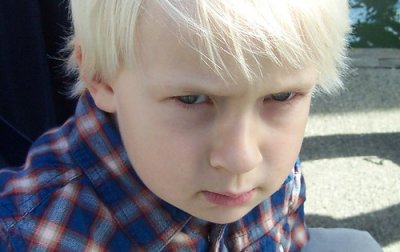The Different Types of Anger and Rage
 by Andrea M. Darcy
by Andrea M. Darcy
Has someone said you have an anger problem? Or do you know that your rage is out of control? Different types of anger can cause different issues, and rage is connected to several mental health diagnoses.
What is anger? A brief introduction
Anger and rage come from the same beginning. We feel frustrated, irritated, and upset about something.
Anger is not ‘bad’ in and of itself. It is simply an emotion, and one that can be very useful for protecting ourselves. It depends on what we do with our anger that determines if it’s a problem or not.
If we use anger as a guide to knowing what we are not happy about, and then calmly let the other person know where our personal boundary lies, anger protects our wellbeing.
But if we judge ourselves for our anger, and repress it instead of express it? It can negatively affect both our health and our relationships.
And what if we refuse responsibility for our anger? Then we enter the territory of rage.
Anger vs rage
Rage means that we refuse to sit with the frustration and upset we feel.
Instead of having the maturity to let it move through us and evolve into a creative solution, we project our frustrated feelings onto others. We try to make someone else deal with our frustration for us.
Whereas anger can be constructive, rage tends to be destructive.
 Rage can also be more physical. As it’s a very high level of anger, your adrenaline, amongst other brain chemicals, soars. So you can feel ‘out of body’, as if things are suddenly hyper clear and 3-D, and physically stronger than usual, even superhuman. Unfortunately this also means you can’t think straight and are less rational.
Rage can also be more physical. As it’s a very high level of anger, your adrenaline, amongst other brain chemicals, soars. So you can feel ‘out of body’, as if things are suddenly hyper clear and 3-D, and physically stronger than usual, even superhuman. Unfortunately this also means you can’t think straight and are less rational.
The different types of anger
When it comes to the different types of anger and rage talked about in psychotherapy, you’ll mostly find talk of the following.
Repressed anger.
This is when you don’t acknowledge your anger but try to push it away and ignore it. All your angry thoughts and feelings bottle up and it does lead to side effects, such as difficult relationships and poor mental and even physical health. Or eventual explosions of misplaced rage.
Passive aggressive anger.
This is where you repress your anger at first, then let it leak out in hidden and unhelpful ways. Instead of setting boundaries and admitting your feelings? You do things to punish the other, such as suddenly ignoring them, blowing hot and cold, or getting angry at them for something illogical instead of the real issue.
Righteous anger.
Not actually psychological term, righteous anger is more connected to religion and political debate. But it is worth mentioning as it can unfortunately be used as an ‘acceptable’ cover for anger issues. An example is people who go to demonstrations and then smash and break things when the actual cause they are demonstrating for does not call for it.
The different types of rage
As well as the different types of anger, there are different types of rage, connected to different disorders.
Narcissistic rage.
Narcissistic rage is rather a dated term, connected back to Freud himself and his school of psychoanalysis. He believed in ‘narcissistic injury’, where someone who is a narcissist feels that their self-esteem or worth is being attacked and their ‘true self’ revealed. They have lost the total control they desire.
Narcissistic rage as a term was coined later, and refers to the narcissist’s incontrollable anger in response to narcissistic injury. They seek revenge for the exposure they feel, purposely hurting the other.
A 2014 study connected narcissistic rage more to vulnerable narcissism than grandiose narcissism. But note that narcissistic personality disorder has since been dropped entirely from the DSM-V as a diagnosis, and while the ICD-10 still contains NPD, vulnerable narcissism is not recognised.
Borderline rage.
Borderline rage is the uncontrollable anger felt by those with borderline personality disorder when they feel rejected or abandoned. A main symptom of BPD is the inability to regulate your emotions, meaning you can go from happy to enraged in seconds, and while you are in a state of rage you can’t seem to stop it.
Borderline personality disorder can see you rage against the very people you love, pushing them away first before your fear that they might push you away can happen. The rage is followed by remorse and depression, as you realise what you have done.
Bipolar rage.

By: muffinn
Bipolar disorder sees you experience both depression and mania. Mania is a state of highly elevated emotions. You feel full of energy and excitement, with racing thoughts, impulsivity, and a sense you are unstoppable.
But you can also feel irritable. For some people with bipolar disorder, this irritability during mania can move into rage. And others find they have issues with anger and aggression even when not manic.
A 2012 study comparing those with bipolar to those without found that, “subjects with BP display greater rates of anger and aggressive behaviours, especially during acute and psychotic episodes.”
Anger disorders
Intermittent explosive disorder (IED).
Intermittent explosive disorder involves impulsive, sudden outbursts of fury and aggression or even violence, that is much bigger than the situation warrants. Some sufferers report feeling not themselves even before being triggered into an outburst.
Only America recognises IED, in their diagnostic manual, the DSM-V. And even then it is often ‘comorbid‘, diagnosed alongside other disorders like bipolar disorder.
Conduct disorders.

By: Gerry Thomasen
Conduct disorders are a group of disorders in children and teens that involve defiant behaviour. This can look like an unusual amount of temper tantrums in younger children, and rebellious or even violent and cruel behaviour in older children and adolescents.
Oppositional defiant disorder (ODD).
Oppositional defiant disorder is one such conduct disorder. It mostly involves angry outbursts and disobedience, as opposed to violent, bullying, and cruel behaviour. And signs are often evident when your child is a pre-schooler.
All children are of course difficult at times. But if your child has ODD, their defiance will be continuous, and will cause real problems at home or school or both. And your child will tend towards vindictiveness and blame.
Other disorders that can involve anger issues
Attention deficit hyperactivity disorder (ADHD).
Adult attention deficit disorder can lead to anger issues in several ways. Frustration at not getting things done, and then irritation at yourself for things like forgetting appointments and upsetting others.
ADHD in children can occur alongside conduct disorders.
Autism Spectrum Disorder (ASD).
Being on the autism spectrum can cause anger outbreaks in children and adults when they can’t communicate what they need to, or due to sensory overload. Anger can come on very quickly and be difficult to control.
Worried about your anger? We connect you to top London psychotherapists and counsellors who can help you with anger management. Or use our online booking platform now to find UK-wide affordable therapists or online therapists you can connect with from anywhere.
 Andrea M. Darcy is a health and wellbeing writer as well as a coach who often writes about trauma, relationships, and ADHD. Find her on Instagram @am_darcy
Andrea M. Darcy is a health and wellbeing writer as well as a coach who often writes about trauma, relationships, and ADHD. Find her on Instagram @am_darcy




